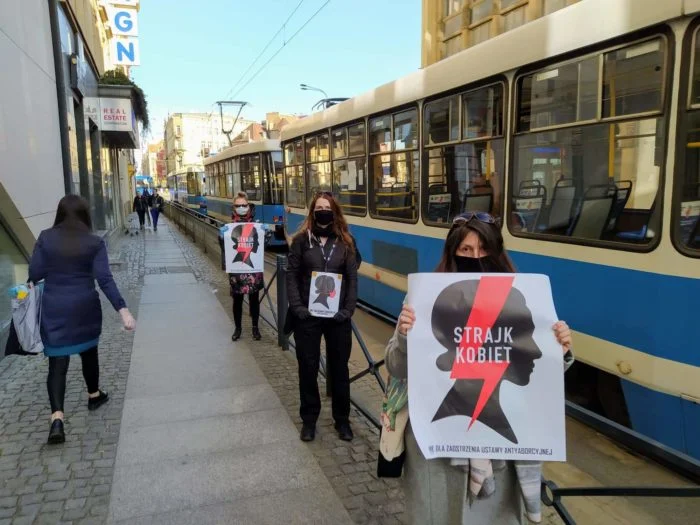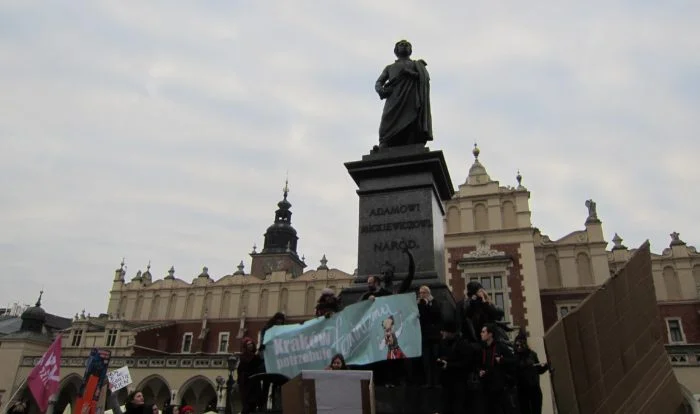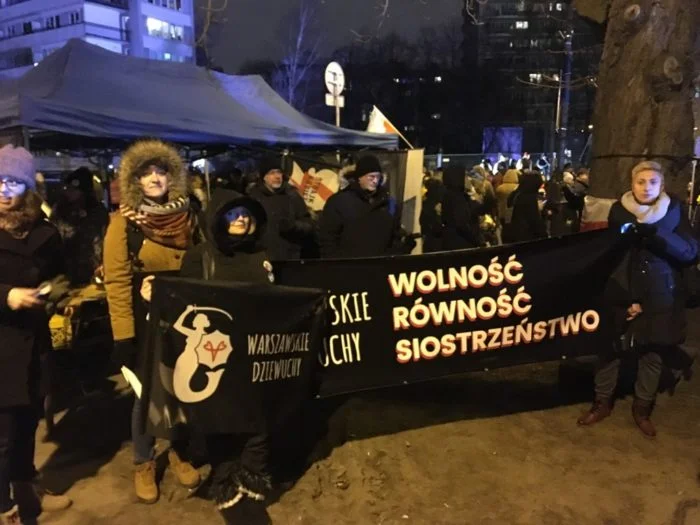A Familiar Battle in Unfamiliar Times

The presidential elections
The corona pandemic hits political systems with no regards to the election cycle or policy agenda. Being hit just before presidential elections, Poland is particular in its response to the new circumstances. The leading party Law and Justice under Jarosław Kaczyński is doing all it can to push through postal presidential elections on the 10th of May. Since the outbreak of the pandemic, election campaigns (apart from incumbent Andrzej Duda who his opponents claim benefits from regular coverage in state television) have stalled and the OSCE/ODIHR is only one voice warnings against the democratic shortcomings of these elections. Pushing through with these elections will according to latest polls secure Duda his win and will provide PiS for another 5 years with a loyal president.
Putting questions of democratic legitimacy and feasibility aside, these elections could be the last straw curtailing women’s reproductive rights in Poland – and establish what activists describe with the hashtag #polskiepiekło – a Polish hell. The incumbent Polish president has already declared that he will sign what is a de facto 98% abortion ban because he sees “eugenic abortion” as murder.
Along with a proposal that would criminalise sex education for minors, the citizens’ initiative “Stop abortion” that was debated in the Sejm yesterday and today, 16 April 2020, would ban about 98% of legal abortions allowed under the current law from 1993. The current law allows abortions only in three cases: if the pregnancy threatens a woman’s life or health; if it is the result of a criminal act (such as rape or incest); or if the foetus is severely malformed. It is the last case that the proposal in question wants to ban.
An inconvenient timing
Women went on streets before against a complete ban of abortion on the Black Protests in October 2016, and a first attempt to ban about 98% of legal abortions in Poland January 2018. They could not prevent the proposals to be passed after a first reading to parliamentary committees, but the pressure was big enough to keep the “Stop abortion” project there until yesterday. Before the 2019 elections the citizens’ initiative to curtail access to abortion was avoided by the governing party because of its mobilisation power. Now it is back, and it so happens to happen in a period of lockdown. The reading of the current citizens’ initiative was pushed to the last possible session – six months after the formation of the new parliament.
Women’s rights activists in Poland have it difficult in ordinary times. On this year’s Manifa – an annual march for women’s rights and equality- which took place only days before the corona lockdown on the 8th of March, activists in Krakow were literally blasted aside by the speakers of anti-choice activists with recorded baby cries, and had to abandon the Adam Mickiewicz statue they had ascended only minutes earlier. The feminist choir that was supposed to end the event did not even try to sing against them. The citizens’ initiative proposing a liberalisation of reproductive rights did not even pass the first reading in the Sejm in January 2018. While polls indicate a relatively small support for further limiting reproductive rights in Poland, those opposing a ban are split between keeping the so-called 1993 “compromise” and those who demand liberalisation, and political oppositional actors besides the Left have found it difficult to embrace liberalisation.

Under lockdown, women in Poland cannot take to the streets. Polish women are among the first to try to organise mass protests in times of the corona lockdown. They form a vanguard and they have been creative: classic forms of political participation such as reaching out to MPs directly and signing online petitions is coupled with decorations of windows, car and bicycle protests in Warsaw, online activism and the use of banners and posters while grocery shopping. The question remaining, however, is whether this activism will reach beyond those women who already closely follow feminist activism. The power of the Black Protest in 2016 and the 2018 protests lay exactly in the wide geographic spread and the big number of women mobilised that had not done so previously. The degree of visibility outside the centres of big cities is rather limited and even in the capital’s residential areas it is difficult to spot symbols of protest.
The timing of the reading has caused outrage as women feel the heavy restrictions in their protest abilities. However, while PiS might be happy about the limited protests, they might not be too glad about the outbreak of yet another battle of worldviews in a difficult time when solidarity and swift concerted actions are needed to fight the spread of the coronavirus. The outcome of this reading that finished today was similar to the previously debated bans or restrictions of abortion: The proposal was sent to the responsible parliamentary committee and will stay there looming, but potentially frozen. Only the radical-right Konfederacja voted unanimously in favour of adopting the proposal into law, whereas the majority of PiS MPs voted to refer the proposal to the committee again, the oppositional Left voted unanimously against the law, as did the centre-right Civic Coalition KO with the exception of one abstention. In the meantime, women in Poland will continue to live under the second most restrictive abortion law in Europe (only Malta prohibits abortion entirely) with the constant threat that the ruling party will take a chance and restrict their reproductive rights. The Senate can only delay the procedure and if incumbent Andrzej Duda gets elected president in May, the president will be of no hope for Polish women.

An international dimension: abortion travels under lockdown
The lockdown effectively constitutes a restriction to reproductive care for women in Poland. Access to gynaecological care, contraception and legal abortion, already the most difficult in Europe, is further limited under lockdown. Many gynaecologists only meet their patients via telephone which cannot fully substitute a face to face examination.
Activism for women’s rights and access to abortion is a project that goes beyond borders. The closures of European borders highlight this interdependence and cooperation. While the Sejm discusses an abortion ban in Poland, Polish women living under the freedom of movement within the EU (and open borders with Ukraine) can seek reproductive care and abortion abroad, provided they have the necessary financial resources and information. Reproductive legislation is left solely to the national legislative within the EU, but in reality, freedom of movement allows women to take advantage of less restrictive laws abroad.
As a response to the corona outbreak national borders have been shut, and dependency among activists increases. Currently, German feminists are campaigning for the declaration of abortion as an essential health treatment under lockdown- which would allow Polish women to continue to cross the border and to receive pregnancy terminations in Germany. The introduction of a two-week quarantine upon entering the country should also be suspended for abortion travels. Slovakia and Ukraine, other popular abortion destinations have sealed their borders completely to foreigners. International networks between women’s rights activists continue to provide help to women seeking abortions abroad but they are subject to national legislations and border regulations. Some women might be able to wait for the lockdown to loosen up, but it remains questionable whether women’s reproductive care will be among the priorities when it comes to reviving national economies.
The current attempt to establish “a Polish hell” or alternatively to put an end to “eugenic abortions” in Poland highlights how women’s rights constitute a core battlefield of Polish politics. And the battle goes on. Reproductive care continues to constitute a policy sphere that stays hotly contested and will not be silenced even in times of the corona lockdown. Cultural politics stay relevant and while activists follow the lockdown rules, activism itself does not quarantine.